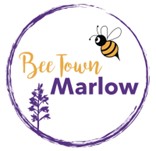Biodiversity and Nature
Pollinator Action Plan
Marlow Town Council’s Pollinator Commitment
We are helping improve local biodiversity for the benefit of both pollinators and people.
To create safe flower rich spaces for pollinators to thrive.
By implementing initiatives and making changes to how we protect, manage, use, and view our natural surroundings.
Our role is to help reclaim, enhance, protect, and better manage pollinator (bees, butterflies, moths and other insects), habitats and greenspaces we are responsible for, to help nature recover and improve our local biodiversity. We will make decisions that positively impact pollinators, ensure our residents understand the importance of our actions and provide opportunities for residents to make Marlow more pollinator friendly.
Wild Verges
Phase I – Selection Strategy
- Highly visible large areas
- Not habitually walked over or parked on
- Not directly in front of houses
- Longer strips to increase the nature corridor
Cutting Regime
- Spring / Summer 2023 – 3 cuts
- Spring / Summer 2024 – 2 cuts
- Spring / Summer 2025 – 1 cut
Phase II – ( coming soon )
- Extend and create more corridors where possible
- Add unused green spaces
- Wild ‘green’ residential pilot
- Raise mower blade for all verges to allow daisies and dandelions to survive a cut
- Work with schools, Bucks, Red Kite and neighbouring parishes to create corridors
Wild Verges Progression
Press Releases
No Mow May
Bee Town

Marlow: England’s first Bee Town
‘We simply wouldn’t be able to survive without bees. As well as boosting our mood when we see them in our woods and gardens, they’re crucial to our physical health and the health of the wider environment.
‘Without bees (and thousands of other insect species that call the UK home), it wouldn’t be long before our ecosystem collapsed. Bees pollinate our wild trees and wild flowers, which then support other insects, which then support birds, bats, mammals and everything up the food chain with food and shelter.’ The Woodland Trust.
Bees are crucial to our survival: almost 90% of wild plants and 75% of leading global crops depend on animal pollination. One out of every three mouthfuls of our food depends on pollinators such as bees, and crops that depend on pollination are five times more valuable than those that do not.
In 2020, Marlow Town Council partnered with Wild Marlow to make Marlow England’s first Bee Town, providing crucial support to these important pollinators.
We saw that Bee Town Marlow could provide a unique focus for many of our environmental activities, and had the potential to involve everyone – schools, businesses, churches, the surrounding area, visitors to the town and residents of all ages and abilities.
Together with Wild Marlow we developed a Pollinator Policy. The Council committed to not using glyphosate (the chemical used in weedkiller that’s harmful to wildlife), to creating and maintaining wildflower areas in the town, to consider the environment in planning decisions and generally to support Wild Marlow’s Bee Town activities.
Bee Town Marlow was launched in summer 2022 with a unique event: a Bee Festival in Higginson Park, organised by Wild Marlow. Stallholders included beekeepers, artists, jewellery designers, bee-themed food, books, bee-friendly plants and many other bee-themed activities. Encouragement from naturalist Steve Backshall came in the form a recorded video, and the many visitors to the event expressed their delight and support. It was a resounding success, and will be repeated bi-annually, with the next one taking place in 2025.
Since the beginning of the project there have been many positive changes in Marlow — all around the town there’s evidence of Bee Town activities. There are wildflower areas with signage explaining that we’re looking after the bees; schools projects; wild verges and wild areas in public spaces. Wild Marlow has held Guides workshops and numerous walks and talks about the importance of bees with local groups.
We’re proud of what Marlow has achieved so far as a committed Bee Town. There’s plenty more to do, though, and we very much hope that you will support us in helping bees to survive and thrive.

